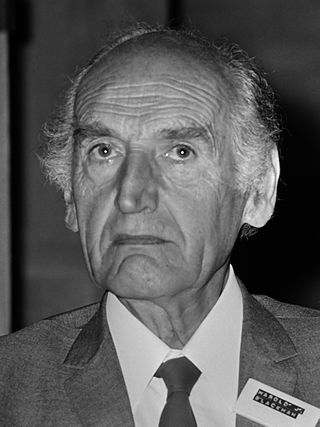Euthanasia is the practice of intentionally ending life to eliminate pain and suffering.

Secular humanism is a philosophy, belief system, or life stance that embraces human reason, logic, secular ethics, and philosophical naturalism, while specifically rejecting religious dogma, supernaturalism, and superstition as the basis of morality and decision-making.

Religious humanism or ethical humanism is an integration of nontheistic humanist philosophy with congregational rites and community activity that center on human needs, interests, and abilities. Religious humanists set themselves apart from secular humanists by characterizing the nontheistic humanist life stance as a non-supernatural "religion" and structuring their organization around a congregational model.

Sir Julian Sorell Huxley was a British evolutionary biologist, eugenicist, and internationalist. He was a proponent of natural selection, and a leading figure in the mid-twentieth century modern synthesis. He was secretary of the Zoological Society of London (1935–1942), the first director of UNESCO, a founding member of the World Wildlife Fund, the president of the British Eugenics Society (1959–1962), and the first president of the British Humanist Association.

Francis August Schaeffer was an American evangelical theologian, philosopher, and Presbyterian pastor. He co-founded the L'Abri community in Switzerland with his wife Edith Schaeffer, née Seville, a prolific author in her own right. Opposed to theological modernism, Schaeffer promoted what he claimed was a more historic Protestant faith and a presuppositional approach to Christian apologetics, which he believed would answer the questions of the age.
The Christian left is a range of Christian political and social movements that largely embrace social justice principles and uphold a social doctrine or social gospel based on their interpretation of the teachings of Christianity. Given the inherent diversity in international political thought, the term Christian left can have different meanings and applications in different countries. While there is much overlap, the Christian left is distinct from liberal Christianity, meaning not all Christian leftists are liberal Christians and vice versa.
A Secular Humanist Declaration was an argument for and statement of support for democratic secular humanism. The document was issued in 1980 by the Council for Democratic and Secular Humanism (CODESH), now the Council for Secular Humanism (CSH). Compiled by Paul Kurtz, it is largely a restatement of the content of the American Humanist Association's 1973 Humanist Manifesto II, of which he was co-author with Edwin H. Wilson. Both Wilson and Kurtz had served as editors of The Humanist, from which Kurtz departed in 1979 and thereafter set about establishing his own movement and his own periodical. His Secular Humanist Declaration was the starting point for these enterprises.

Humanist Manifesto is the title of three manifestos laying out a humanist worldview. They are the original A Humanist Manifesto, the Humanist Manifesto II (1973), and Humanism and Its Aspirations: Humanist Manifesto III (2003). The original manifesto originally arose from religious humanism, though secular humanists also signed.
Humanist Manifesto II, written in 1973 by humanists Paul Kurtz and Edwin H. Wilson, was an update to the previous Humanist Manifesto published in 1933, and the second entry in the Humanist Manifesto series. It begins with a statement that the excesses of National Socialism and world war had made the first Manifesto seem too optimistic, and indicated a more hardheaded and realistic approach in its seventeen-point statement, which was much longer and more elaborate than the previous version. Nevertheless, much of the optimism of the first remained in its expressed hope that war and poverty would be eliminated.
Situational ethics or situation ethics takes into account only the particular context of an act when evaluating it ethically, rather than judging it only according to absolute moral standards. With the intent to have a fair basis for judgments or action, one looks to personal ideals of what is appropriate to guide them, rather than an unchanging universal code of conduct, such as Biblical law under divine command theory or the Kantian categorical imperative. Proponents of situational approaches to ethics include existentialist philosophers such as Sartre, de Beauvoir, Merleau-Ponty, Jaspers, and Heidegger.

Charles Francis Potter was an American Unitarian minister, theologian, and author.

Harold John Blackham was a leading British humanist philosopher, writer and educationalist. He has been described as the "progenitor of modern humanism in Britain".
Secular ethics is a branch of moral philosophy in which ethics is based solely on human faculties such as logic, empathy, reason or moral intuition, and not derived from belief in supernatural revelation or guidance—a source of ethics in many religions. Secular ethics refers to any ethical system that does not draw on the supernatural, and includes humanism, secularism and freethinking. A classical example of literature on secular ethics is the Kural text, authored by the ancient Indian philosopher Valluvar.
Alan Frank Guttmacher was an American obstetrician/gynecologist. He served as president of Planned Parenthood and vice-president of the American Eugenics Society. Guttmacher founded the American Association of Planned Parenthood Physicians, now known as the Association of Reproductive Health Professionals, as a forum for physicians to discuss the birth control pill and other advances in the field. He founded the Association for the Study of Abortion in 1964. He was a member of the Association for Voluntary Sterilization. The Guttmacher Institute is named after him.
Non-voluntary euthanasia is euthanasia conducted when the explicit consent of the individual concerned is unavailable, such as when the person is in a persistent vegetative state, or in the case of young children. It contrasts with involuntary euthanasia, when euthanasia is performed against the will of the patient.
Canon 915, one of the canons in the 1983 Code of Canon Law of the Latin Church of the Catholic Church, forbids the administration of Holy Communion to those upon whom the penalty of excommunication or interdict has been imposed or declared, or who obstinately persist in manifest grave sin:
Those who have been excommunicated or interdicted after the imposition or declaration of the penalty and others obstinately persevering in manifest grave sin are not to be admitted to holy communion.
Child euthanasia is a form of euthanasia that is applied to children who are gravely ill or have significant birth defects. In 2005, the Netherlands became the first country since the end of Nazi Germany to decriminalize euthanasia for infants with hopeless prognosis and intractable pain. Nine years later, Belgium amended its 2002 Euthanasia Act to extend the rights of euthanasia to minors. Like adult euthanasia, there is world-wide public controversy and ethical debate over the moral, philosophical and religious issues of child euthanasia.
Articles related to philosophy of religion include:

Eugenics, the set of beliefs and practices which aims at improving the genetic quality of the human population, played a significant role in the history and culture of the United States from the late 19th century into the mid-20th century. The cause became increasingly promoted by intellectuals of the Progressive Era.





